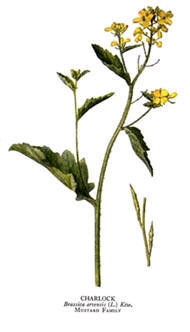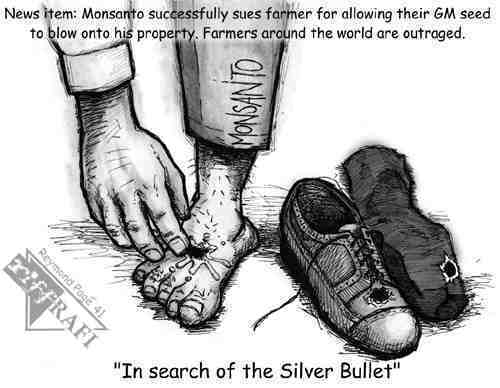The latest from the Environment Society of Australia - click here to see all the news
GM super-weed discovered in UK field
The first genetically modified super-weed has been
discovered in the UK - the result of GM oilseed rape cross-breeding with
a common weed in farm scale trials, according to new Government
research.
August 27,
2005 Daily Mail
Environmental campaign group Friends of the Earth (FoE)
said the revelation raises serious concerns about the impact of
growing GM oilseed rape in the UK - and comes less than a month
after the UK tried to persuade other European countries to lift
their own bans on growing GM oilseed rape.
FoE said the Government study monitored gene flow from Bayer's
herbicide-resistant GM oilseed rape to related wild plants during
the Government-sponsored farm scale evaluations of GM crops.
At one test site, the researchers found a GM version of the common
weed charlock growing in the field, the year after the GM trial.
The plant was resistant to the weed killer used in the GM trial and
was confirmed as containing the gene inserted into the GM oilseed
rape.
It is the first known case of such an occurrence in the UK and
overturns previous scientific assumptions that charlock was unlikely
to cross-breed with GM oilseed rape.
Charlock is a common weed found alongside oilseed rape in the UK and
mainland Europe. If GM oilseed rape was grown commercially,
herbicide-resistant weeds could become widespread.
Farmers would then have to use more and more damaging weedkillers to
get rid of them, with knock-on impacts on the environment.
Bayer has lodged two applications for approval to grow GM oilseed
rape with the European Commission. Approval would allow the GM
oilseed to be grown in the UK.
FoE said that last month Environment Minister Elliot Morley voted to
try to force France and Greece to lift their bans on GM oilseed
rape.
The bans were originally put in place in 1998 because of concerns
about gene escape into the environment.
No new evidence
FoE said Mr Morley justified the UK position, saying that he had to
vote on the basis of the available science, whilst his department
was holding research confirming the risk of gene escape from GM
oilseed rape.
Mr Morley told BBC Radio 4's Farming Today programme on June 24:
"We'll vote on the basis of the scientific advice that we've
received.
"And they are all saying that as there has been no new evidence
brought forward to defend the argument for a blanket ban, there is
no reason not to support the commission."
The minister acknowledged there was widespread public opposition to
GM crops which could not be ignored.
He added: "But on the other hand we cannot deviate from the
scientific advice because otherwise we do leave ourselves open to
pressure from commercial companies, for example, and we are not
going to bow to that."
GM 'harms wildlife'
FoE's GM campaigner Emily Diamand said: "The Government's trials
have already shown that growing GM crops can harm wildlife. Now
we're seeing the real possibility of GM super-weeds being created,
with serious consequences for farmers and the environment.
"What is disturbing is the way the Government appears to have
ignored its own evidence in trying to force GM crops on to countries
that have a real cause for concern.
"The Government must stop acting as cheerleader for GM crops and
start paying attention to its own research, and above all, to the
British public."
Mr Morley today denied the Government was acting as a "cheerleader"
for GM crops.
He said it was hardly a rational claim when it was government
sponsored trials and research that had uncovered potential
biodiversity problems with some GM lines.
"No one can state conclusively that GM technology is either wholly
good or wholly bad," Mr Morley said.
"Government does not promote GMs - our duty as regulators is to
ensure that the decisions we take are precautionary and strictly
evidence-based. We take the only sensible approach, to assess each
crop on a case-by-case basis.
"It has been widely and openly accepted for some time now that gene
transfer from oil seed rape to its wild relatives is possible. This
research project sought to investigate the extent to which that
transfer can occur.
"Government operates such programmes precisely to assess the likely
risk, and gather reliable scientific evidence, so that decisions can
be made on the basis of fact. All the findings are published. This
is all part of the research funded by the Government to look at all
aspects of GM safety.
"Contrary to some media reports, the so-called hybrid has not been
confirmed by researchers as a cross between oil seed rape and
charlock but is a finding we cannot ignore.
"A year later when researchers revisited the site where the possible
hybrid plant had been found, and took seeds from the plants growing
there, they found no evidence of gene transfer.
"So even if a hybrid did once exist it has disappeared. We do
however, need to improve our understanding of all aspects of gene
transfer and this means we must take this into account with
individual GM applications.
"Our top priority is to safeguard human health and the environment.
There are no trials of GM oil seed rape in the UK at the moment. No
consents for commercial cultivation in EU have been issued and there
are none in the pipeline."


GM Activists storm Stage at Bayer AGM in
Cologne
by Mr Bayer 1:47pm Fri Apr 26 '02






